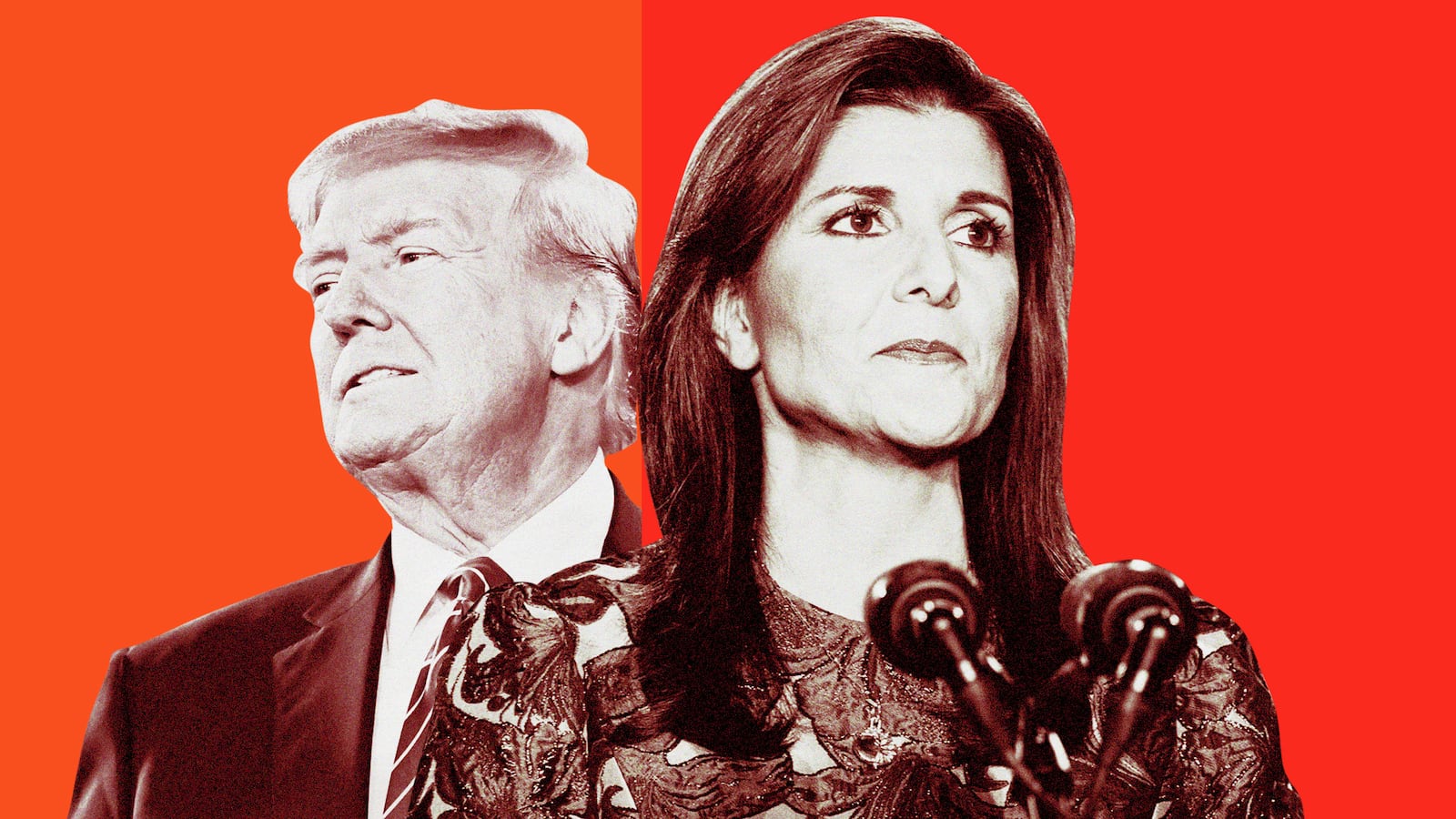Is Nikki Haley a middle-of-the-road Republican? The kind they used to make before Donald Trump hijacked the GOP and obliterated the traditional conservative order?
In messaging and demeanor, maybe, but not in policies. She’s a hardliner on the use of military force and no softie when it comes to government aid. She refused recently to support an emerging bipartisan effort in Congress to expand the child tax credit for low-income families, and as U.S. ambassador to the U.N., she wanted to defund the U.N. agency providing critical aid to the Palestinians, even after touring a refugee camp and seeing the need.
As a presidential appointee, she excelled at getting around White House gatekeepers to secure face time with President Trump. Then-Chief of Staff John Kelly had to scramble to bring then-Secretary of State Rex Tillerson to an Oval Office meeting with the president—in an effort to rebut Haley’s push to yank funding.
On the campaign trail, Haley vows to defund as much of the U.N. as possible, stopping just short of saying she would have the United States withdraw from the international body. She supports aid to Ukraine but on most other issues, foreign and domestic, she lines up with the hardliners in her party.
She hasn’t really challenged Trump on any of his policies, and says he was the right president for the moment, but that moment has passed, therefore it’s time for someone who’s not 80 to lead the country, a criticism pointed more at President Joe Biden.
But by getting “almost half of the vote” in New Hampshire—her characterization of the 44 percent she received against Trump’s 55.3 percent—she is exposing Trump’s vulnerabilities with suburban women, college-educated voters, and independents looking for someone more moderate than Trump, a persona more than a compilation of policies.

Republican presidential candidate and former U.S. President Donald Trump during his primary night rally at the Sheraton on Jan. 23, 2024, in Nashua, New Hampshire.
Alex Wong/Getty Images“The low bar for being called a moderate is not calling people names, and not inciting an insurrection,” says Jack Pitney, professor of American politics at Claremont McKenna College. “She’s a moderate by the standards of the South Carolina legislature, but in a general election, her positions might generate a lot of ammunition for Biden.”
Haley strongly defended flying the Confederate flag throughout her career, until that became impossible after the 2015 massacre at Mother Emanuel AME church when, under the national spotlight, she reversed course, earning accolades for moving the flag off the statehouse grounds.
That’s probably when she was first crowned a moderate. Campaigning last month in New Hampshire, she stumbled answering a question about the cause of the Civil War, saying it was about the role of government. She later added slavery as a cause only when pressed, and then insisted repeatedly that the United States is not and has never been a racist country.
The correct term for Haley’s brand of moderation is “process moderate,” says Elaine Kamarck, a senior fellow in governance studies at The Brookings Institution. In a Republican party where 80 percent of those who voted for Trump in New Hampshire buy Trump’s lie that the 2020 election was stolen from him, Haley stands alone and proud. She admits Biden was legitimately elected, and she upholds the Constitution, and the rule of law.
The angry tirade that Trump delivered after his big win in New Hampshire is “a measure of his sexism,” says Kamarck. “Women get under his skin more than men.” Trump was furious that Haley claimed the media stage before he did, sounding and looking like a winner in her sparkly blue dress when she was just seven points behind what would be a double-digit loss. He called her “an imposter” and said he couldn’t let her “get away with bullshit.”

Republican presidential candidate former U.N. Ambassador Nikki Haley delivers remarks at her primary night rally at the Grappone Conference Center on Jan. 23, 2024, in Concord, New Hampshire.
Joe Raedle/Joe Raedle/Getty ImagesKamarck disagrees with analysts who question Haley’s decision to stay in the race when she’s facing likely humiliation in the primary in her home state of South Carolina on Feb. 24. If her money doesn’t run out, she serves a useful purpose as a backup, break-the-glass candidate, who could win some delegates and step in should there be a legal crisis or a health crisis that derails Trump. There’s enough uncertainty surrounding Trump that Haley’s rationale could buy her time.
And if this ends like most analysts expect it will—with Haley endorsing Trump before or after South Carolina—and he loses the November election, “She’s the I told you so candidate,” says Kamarck. “And even if he wins, he’s only there four years. She’ll be 56 years old! (Haley just turned 52 this month) Her staying in is really pissing him off.”
The next four weeks until South Carolina will test how well Haley can live off the land as an insurgent candidate.
It’s reminiscent of the 2016 Democratic race when Bernie Sanders stayed in the race long after it became mathematically impossible for him to catch up with Hillary Clinton in the number of delegates needed. Sanders continued to hammer away at Clinton for accepting large speaking fees from Wall Street firms, questioning her ethics and her character, and keeping the issue centerstage in the general election against Trump.
Haley is reminding voters what they don’t like about Trump, and he’s taking the bait, calling her “Birdbrain.” She’s calling him out in a way that is damaging to voters he needs to win in a general election, notably suburban women, college-educated Republicans, and independents. “All she needs to do for Biden to win is take about 11 percent of the Republican vote, convince them to stay home or vote for a third party,” and that could swing the election, says Kamarck, who arrived at the 11 percent figure because it was former New Jersey Gov. Chris Christie’s high water mark in polling before he dropped out of the race.
Seldom do any well-laid plans play out like they’re supposed to, and Haley’s fizzled late surges in Iowa and New Hampshire would send any other candidate packing. But not Haley, whose message is that two senior citizens are not qualified to lead the country—a call for generational change when the far bigger issue is that Trump instigated a violent attack on the country.
If she wants to go out telling uncomfortable truths, she should tell that one, too.









